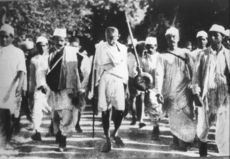I don't know why companies do not give enough importance to their vision and mission statements. As organizations grow larger and larger, it is only the top management that has any clue about why the business exists in the first place. Employees lower down the hierarchy are unable to see the grand pattern in their mundane day to day activities. When employees find that the organization's goals are not in sync with their own personal goals (or when they have no clue about what the organizations's goals are) they start looking out for other jobs. People like to, and should, be part of causes which are larger than themselves. The employees at Google, are likely to strongly believe that what they do on a day to day basis will revolutionalize the way people view computing and technology. Check this link, to gain an insight into Google's corporate philosophy.
Vision statements and mission statements convey in a few words, what it is that the organization exists in the world for. Their brevity enables stakeholders to easily remember, imbibe and apply the tenets of the founding fathers of the organization. It also tells you in a few words whether or not an organization is for you or not. If a company's mission statement was - "To be the most ruthless widget manufacturer with the supreme goal of wiping out competition" - would you join it? Of course, I have to admit that most vision/ mission statements are really sugar coated and sound glorious. That is only because the people who are crafting them do not think the exercise will add any value to their organizations. They think it's more of a PR exercise for the benefit of the outside world.
If companies pay closer attention to the vision/mission statement, and tie organizational objectives to it, evaluate every step they take in terms of whether or not it will help them achive their mission, employees would be much happier. At least, they would have a clue about what the hell is going on, instead of just selling more of whatever it is that they sell.
Incidentally, the Balance Scorecard is one such approach where strategy flows from the organization's vision and is translated into four perspectives - financial, internal, customer and organizational development. It is inherently a good concept, and it probably works because most organizations rarely have a right brained vision/mission. They usually have a very quantified, market related definition of why they exist. With a left brained mission like "being number one in the market", a Balance Scorecard becomes like a simple execution roadmap for the same. It lacks that one key magic element - "passion".
Needless to say, just having a great mission/vision statment is only the first step. The next step is of course execution! This is done through rewarding employees who actively demonstrate the values of the company in their day to day dealings with other people.
Of course the job doesn't just end with Vision / Mission Statements. These statements must also flow in the values, which in turn flows into actual behaviours and organizational culture.
Read this new post for more on this topic.
Also check this post on Netflix's culture and values.
